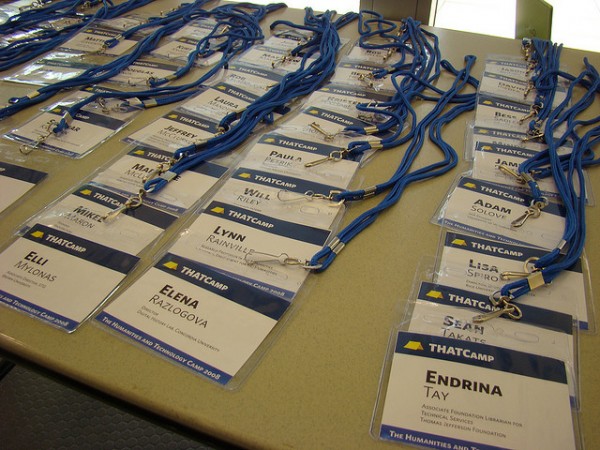Yesterday I read Brian Croxall’s post “Why the 2013 MLA Digital Pedagogy Unconference Isn’t a THATCamp” with interest. And although it may sound like unhealthily low self-esteem, I’d say that on the whole I agree with Brian that “within academia–or at least in the humanities, where I spend most of my time–unconferences have become synonymous with THATCamp. And I don’t think that’s healthy.” As I wrote a few months ago in a post called “The Unconference is Alive,” there are plenty and plenty and plenty of unconferences besides THATCamp, on all
When I first started as THATCamp Coordinator, I thought that people would be much more interested in “hacking” the THATCamp format than they have been. Most of the queries I’ve gotten from people thinking of organizing a THATCamp have been questions on what exactly they should do, not what else they might do besides the usual. Basically, I think, THATCamp has been as popular as it is partly because it offers a standard model that can be easily followed: set up a WordPress website, recruit participants, call for participants to post session proposals to the blog, organize sessions into a schedule during the first 90 minutes, have workshops, have discussions, have Dork Shorts, then repair to the nearby Irish pub for a few beers. Certainly I could take some of the blame for the increasing rigidity of that model, but I’ve found that most people are just unnerved enough by the idea of organizing a THATCamp that they’d like to keep it as simple as possible, go with what works, use existing templates. Even Brian and Adeline have used some THATCamp.org text on their own website, and more power to them — that’s why it’s licensed CC-BY. One of the real innovations of THATCamp, after all, is that anyone can organize one without needing the infrastructure of a scholarly association: one of the real difficulties of organizing a THATCamp, as well, is not having the infrastructure of a scholarly association. When you’re going it alone, it helps to have a model to draw on, even if you decide to alter that model.
I do think that people going to MLA might get a bit confused about what the difference is between THATCamp MLA and the Digital Pedagogy Unconference, or wonder why they might go to one instead of the other, but to those hypothetical people I say, go to both! THATCamp MLA is January 2nd and the Digital Pedagogy unconference is January 3.
What I also hope will happen is that more people in academia will try out more new kinds of meeting formats. You can make them up, of course, but if that sounds a bit intimidating, try the book Open Space Technology (e.g., get everyone in a circle and ask them to address one question) or the book Mob Rule Learning (especially the section on “Facilitation Styles,” including “appreciative inquiry,” “dotmocracy,” “birds of a feather,” “fishbowl,” and more). Happy unconferencing …




Thanks for your thoughts, Amanda, and for the link to the previous post about the unconference being alive. I’d missed that one previously. I think part of what makes THATCamp truly special is that I knew that the whole group of people behind it would be supportive of the distinction that Adeline and I have been trying to set up. And if we can get all of academia on board with that–WELL!
Oh, and I forgot to say that one of the reasons I wrote that post is to try to point out the very real differences between THATCamp MLA and our workshop. It is definitely something that can confuse people. But hopefully confused people still get something that proves helpful!
Absolutely — that was a good post. I just worry that not everyone subscribes to your blog, Brian. Especially now that you’re dead to Dan Cohen. 🙂 And actually I’m super-glad that there’s something unconferencey that’s actually ON the MLA program. Even the roundtables in my experience have been like 5 10-minute presentations instead of, you know, actual roundtable discussions.